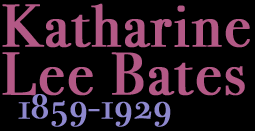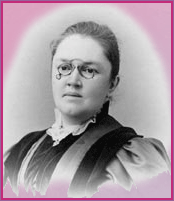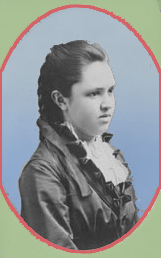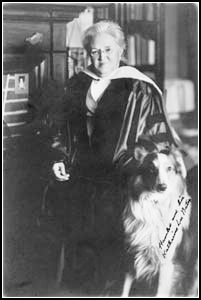 |
 |
 |
womenshistory.about.com |
|
Katharine Lee Bates was an ardent feminist and the author of the song "America the Beautiful." She attended Wellesley college and later returned to join the faculty. While on staff she met Katharine Coman and began a relationship that lasted for 25 years. Bates and Coman's relationship might be best described as a romantic friendship. It is not clear whether their relationship was sexual, but it was intensely loving; Bates referred to Coman as her "Joy of Life" and wrote many poems about their love. Both women had successful careers at Wellesley college--Bates became chair of the English department, while Coman became chair of the Economics Department and Dean of the college. They kept contact with other educated women who lived in couples as they did, but they did not assume roles as lesbian activists. In 1912, Coman was diagnosed with cancer, and Bates nursed her until Coman died in 1915. In 1922, Bates published a limited volume of poetry entitled, "Yellow Clover," where she wrote of their relationship. Bates remained at Wellesley until she retired in 1925. She died four years later, at the age of 70. Only a few years before her death, she wrote to a friend, "So much of me died with Katharine Coman that I'm sometimes not quite sure whether I'm alive or not." Biography by Alix North |
 If You Could
Come I would not ask you if
those golden spheres One touch of you were
worth a thousand creeds.
|
|
Bates dedicated her book Yellow Clover: A Book of Remembrance, to Katharine Coman. Much of the poetry contained therein refers to her relationship with Coman. Bates shared many years with her companion, Coman, who was a professor, department chair and dean at Wellesley College.
Must I, who walk
alone, So it began, Our golden cord! our soft,
pursuing flame My sorrow asks no healing;
it is love; |
Bates was born in Falmouth, Massachusetts. The daughter of a Congregational pastor, she graduated from Wellesley College in 1880 and for many years was a professor of English literature at Wellesley. She lived there with her partner Katharine Coman, who herself was a history and political economy teacher and founder of the Wellesley College Economics department. The same-sex pair lived together for twenty-five years until Coman's death in 1915. The first draft of America the Beautiful was hastily jotted in a notebook during the summer of 1893, which Miss Bates spent teaching English at Colorado College in Colorado Springs, Colorado. Later she remembered, "One day some of the other teachers and I decided to go on a trip to 14,000-foot Pikes Peak. We hired a prairie wagon. Near the top we had to leave the wagon and go the rest of the way on mules. I was very tired. But when I saw the view, I felt great joy. All the wonder of America seemed displayed there, with the sea-like expanse." The words to her one famous poem first appeared in print in The Congregationalist, a weekly journal, for Independence Day, 1895. The poem reached a wider audience when her revised version was printed in the Boston Evening Transcript, November 19, 1904. Her final expanded version was written in 1913. The hymn has been sung to other music, but the familiar tune that Ray Charles delivered is by Samuel A. Ward (1847-1903), written for his hymn Materna (1882). Miss Bates was a prolific author of many volumes of poetry, travel books and children's books. Her family home on Falmouth's Main Street is preserved by the Falmouth Historical Society. Katharine Lee Bates died in Wellesley, Massachusetts, on March 26, 1929. -- Wikipedia Katharine B. and Katharine C. While on the faculty at Wellesley College, Bates met Katharine Coman with whom she formed a "romantic friendship." Coman served on the faculty as the chair of the Economics Department and Dean of the college. Bates and Coman lived as a couple for 25 years in what is sometimes referred to as a "Boston marriage." In 1912, Coman was diagnosed with cancer. Bates nursed Coman through three painful years of physical decline. Katherine Coman died in 1915. "So much of me died with Katharine Coman that I'm sometimes not quite sure whether I'm alive or not." - K. L. Bates -- Lambda.net
In her obituary, printed in Wellesley's The Townsman, Mr. Bradford wrote: The death of Katharine Lee Bates means the passing away of one of the most notable citizens of Wellesley, one of the most important figures connected with Wellesley College, and much more than that, a considerable author and creative influence in the whole of American life. |
Click here
![]() to return to GayHeroes Home Page
to return to GayHeroes Home Page